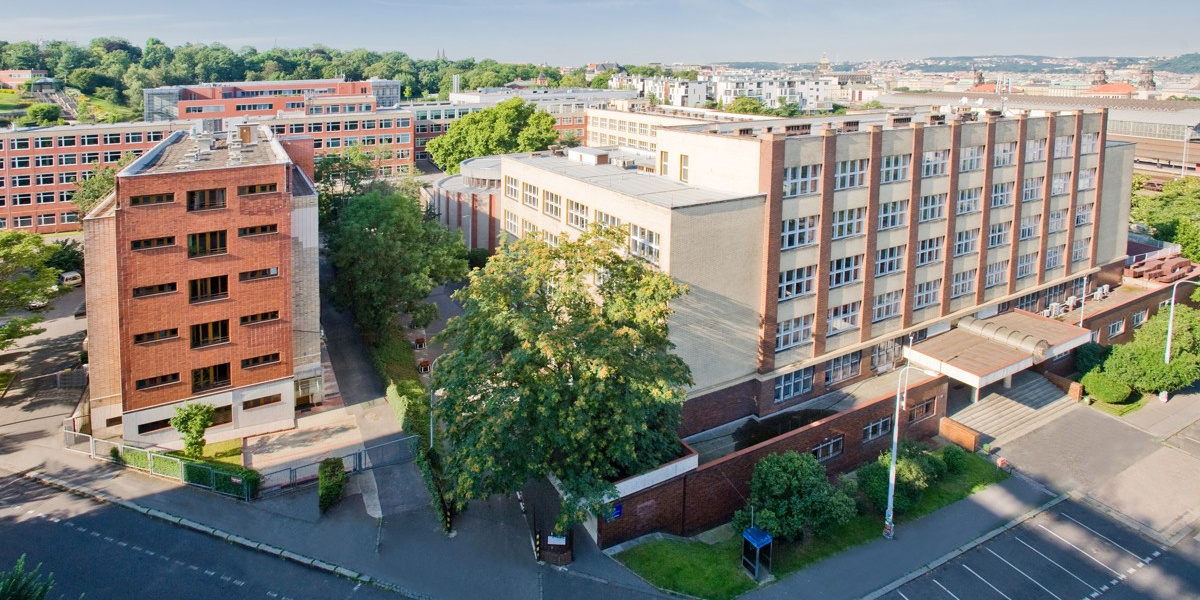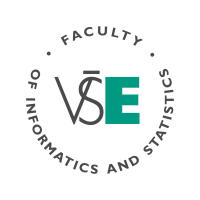Scope of the Conference
- Operations research
- Econometrics
- Multiple criteria decision making, decision support systems
- Quantitative management methods
- Interval systems
- Simulation
- Mathematical modelling
- Process optimization
- Financial modelling

The conference Mathematical Methods in Economics is a traditional meeting of professionals from universities and businesses interested in the theory and applications of operations research and econometrics.
The conference will be held fully on-site at the Faculty of Informatics and Statistics, Prague University of Economics and Business.



The conference will be held in person only. Participation is possible in three variants:
All participants are required to register and pay the conference fee, which is the same for all three variants.
Czech Society for Operations Research organizes a competition for the best paper authored by PhD students presented on the conference Mathematical Methods in Economics 2023. All participants enrolled in PhD studies can participate in the competition. All papers will be peer-reviewed and the papers with positive referee reports will be further evaluated by the conference Programme Committee.
Only papers authored by a PhD student or a collective of PhD students are eligible for the PhD students competition. Papers authored or co-authored by a person that is not a PhD student will be disqualified from the competition and regarded as regular conference paper submissions.
| First prize | Czech Society for Operations Research Award and 10 000 CZK |
| Second prize | 5 000 CZK |
| Third prize | 3 000 CZK |
| Fourth, fifth, sixth prize | 1 000 CZK |
The winners will be announced at the ceremony on September 14 during the conference dinner.
| February 15 | Submission opening |
| April 17 | Abstract submission deadline |
| April 30 | Notification of abstract acceptance |
| May 15 | Registration opening |
| May 22 | Full paper submission deadline |
| June 19 | Notification of full paper acceptance |
| July 15 | Registration and payment deadline |
| September 13–15 | Conference |
Regular fee: 7 500 CZK / 330 EUR
Fee for Ph.D. students: 4 500 CZK / 200 EUR (The participant should send a scanned copy of their valid confirmation of study to mme2023@vse.cz before the payment to be entitled as students' fee)
The conference fee covers:
The accommodation and transport is not included in the registration fee. Participants should make accommodation reservations individually, directly to the selected hostel/hotel. Participants have to arrange visa at their own.
The fee must be paid at registration, which is opened from May 15 to July 15.
| Wednesday, September 13, 2023 | |
|---|---|
| 08:30–10:00 | Registration of participants |
| 10:00–12:00 | Opening ceremony and plenary session |
| 12:00–13:00 | Lunch |
| 13:00–14:30 | Parallel sessions A |
| 14:30–15:00 | Coffee break |
| 15:00–16:30 | Parallel sessions B |
| 16:30–17:00 | Coffee break |
| 17:00–18:00 | Meeting of the Czech Society for Operations Research |
| 18:30–21:30 | Welcome evening at Academic Club restaurant |
| Thursday, September 14, 2023 | |
|---|---|
| 08:30–10:00 | Parallel sessions C, including PhD students competition and registration of participants |
| 10:00–10:30 | Coffee break |
| 10:30–12:00 | Parallel sessions D, including PhD students competition |
| 12:00–13:00 | Lunch |
| 13:00–19:00 | Conference trip / social programme |
| 20:00–23:00 | Conference dinner at Červený Jelen restaurant, including the ceremony announcing the results of the PhD students competition |
| Friday, September 15, 2023 | |
|---|---|
| 09:00–09:30 | Morning coffee |
| 09:30–11:00 | Parallel sessions E |
| 11:30–12:30 | Lunch |
Download the full programme here.

Professor Dimitris K. Despotis, Ph.D.
Network Data Envelopment Analysis: The Prevalent Methodological Approaches and Some Recent Developments
Network data envelopment analysis (NDEA) is an extension of standard data envelopment analysis (DEA) that models the efficiency assessment of DMUs by considering their internal structure. While in standard DEA the DMU is regarded as a single process, in NDEA the DMU is viewed as a network of interconnected sub-processes (stages, divisions), where the flow of the intermediate products (measures) is essential in the efficiency assessment. In the prevalent conventional methodological approaches to NDEA, the sub-processes are assumed as distinct entities with distinct inputs and outputs. Thus, each sub-process has its own production possibility set (PPS), which can be derived axiomatically from a set of assumptions using the minimum extrapolation principle. The PPS of the overall system is defined as the composition of the individual PPSs. We outline in this presentation the basic NDEA methods established in the literature, and we discuss their limitations, merits, and drawbacks.

doc. RNDr. Ing. Miloš Kopa, Ph.D.
Decision Making in Finance via Stochastic Dominance
Stochastic dominance is a statistical tool developed for comparing the random variables among each other. In financial applications, these random variables represents random returns of the considered assets or portfolios. The paper focuses on portfolio selection problems with stochastic dominance constraints for various orders of stochastic dominance relations. Firstly, the tractable necessary and sufficient conditions for particular probability distributions are discussed. Secondly, these conditions are employed in the portfolio selection problems. Finally, the extensions for the case of endogenous randomness are presented. The theoretical results are accompanied by numerical examples.
Participants are invited to submit an abstract concerning one or more of the subject areas of the conference according to the following instructions:
After the acceptance of the abstract, prospective authors are invited to submit a full version of the conference paper according to the following instructions:
Please fill out the registration form.
After the registration, proceed with the payment of the conference fees.
Deadline for the registration and payment is July 15.
| Bank: | Česká spořitelna, a.s. |
| Bank code: | 0800 |
| Swift: | GIBACZPX |
| Recipient: | Departments of VŠE Praha |
| Account number: | 1828782/0800 |
| IBAN: | CZ21 0800 0000 0000 0182 8782 |
| Variable symbol: | 403033 |
| Message: | The name of the participant |
The conference is hosted by Prague University of Economics and Business. It is the largest public university in the field of economics, business, and information technology in the Czech Republic. Five of its faculties are located in Prague while the sixth faculty is located in Jindřichův Hradec. The university is ranked as one of the best business schools in Central and Eastern Europe.
For more information, visit the official website of the university.
The conference will take place at Žižkov Campus of Prague University of Economics and Business located at Winston Churchill Square 1938/4, 130 67 Prague 3, Czech Republic.
The campus can be reached on foot from the main train station (Praha hlavní nádraží) via the passageway to Žižkov. Alternatively, you can take a tram to Viktoria Žižkov station or a bus to Náměstí Winstona Churchilla station.
The campus map can be downloaded here.
| prof. RNDr. Helena Brožová, CSc. Czech University of Life Science Prague, Faculty of Economics and Management |
| prof. Ing. Mgr. Martin Dlouhý, Dr., MSc. Prague University of Economics and Business, Faculty of Informatics and Statistics |
| doc. Ing. Jan Fábry, Ph.D. ŠKODA AUTO University |
| prof. RNDr. Ing. Petr Fiala, CSc., MBA Prague University of Economics and Business, Faculty of Informatics and Statistics |
| prof. Ing. Jana Hančlová, CSc. Technical University of Ostrava, Faculty of Economics |
| Mgr. Vladimír Holý, Ph.D. Prague University of Economics and Business, Faculty of Informatics and Statistics |
| prof. Ing. Josef Jablonský, CSc. Prague University of Economics and Business, Faculty of Informatics and Statistics |
| doc. RNDr. Jana Klicnarová, Ph.D. University of South Bohemia, Faculty of Economics |
| Ing. František Koblasa, Ph.D. Technical University of Liberec, Faculty of Mechanical Engineering |
| doc. RNDr. Ing. Miloš Kopa, Ph.D. Charles University, Faculty of Mathematics and Physics |
| Ing. Martina Kuncová, Ph.D. College of Polytechnics Jihlava Prague University of Economics and Business, Faculty of Informatics and Statistics |
| prof. RNDr. Jan Pelikán, CSc. Prague University of Economics and Business, Faculty of Informatics and Statistics |
| prof. Dr. Ing. Miroslav Plevný University of West Bohemia, Faculty of Economics |
| prof. RNDr. Jaroslav Ramík, CSc. Silesian University in Opava, School of Business Administration in Karviná |
| Mgr. Jana Sekničková, Ph.D. Prague University of Economics and Business, Faculty of Informatics and Statistics |
| Ing. Karel Sladký, CSc. Academy of Sciences of the Czech Republic, Institute of Information Theory and Automation |
| Ing. Ondřej Sokol, Ph.D. Prague University of Economics and Business, Faculty of Informatics and Statistics |
| doc. Ing. Tomáš Šubrt, Ph.D. Czech University of Life Science Prague, Faculty of Economics and Management |
| doc. RNDr. Jana Talašová, CSc. Palacký University in Olomouc, Faculty of Science |
| Ing. Miroslav Vavroušek, Ph.D. Technical University of Liberec, Faculty of Mechanical Engineering |
| prof. RNDr. Milan Vlach, DrSc. Charles University in Prague, Faculty of Mathematics and Physics The Kyoto College of Graduate Studies for Informatics |
| prof. RNDr. Karel Zimmermann, DrSc. Charles University in Prague, Faculty of Mathematics and Physics |
| prof. Ing. Miroslav Žižka, Ph.D. Technical University of Liberec, Faculty of Economics |
| prof. Ing. Mgr. Martin Dlouhý, Dr., MSc. Prague University of Economics and Business, Faculty of Informatics and Statistics |
| Mgr. Vladimír Holý, Ph.D. Prague University of Economics and Business, Faculty of Informatics and Statistics |
| prof. Ing. Josef Jablonský, CSc. Prague University of Economics and Business, Faculty of Informatics and Statistics |
| Ing. Martina Kuncová, Ph.D. College of Polytechnics Jihlava Prague University of Economics and Business, Faculty of Informatics and Statistics |
| Mgr. Jana Sekničková, Ph.D. Prague University of Economics and Business, Faculty of Informatics and Statistics |
| Ing. Ondřej Sokol, Ph.D. Prague University of Economics and Business, Faculty of Informatics and Statistics |
| Ing. Bc. Petra Zýková, Ph.D. Prague University of Economics and Business, Faculty of Informatics and Statistics |